Read Reviews
The Best Pressure Washers Under £100
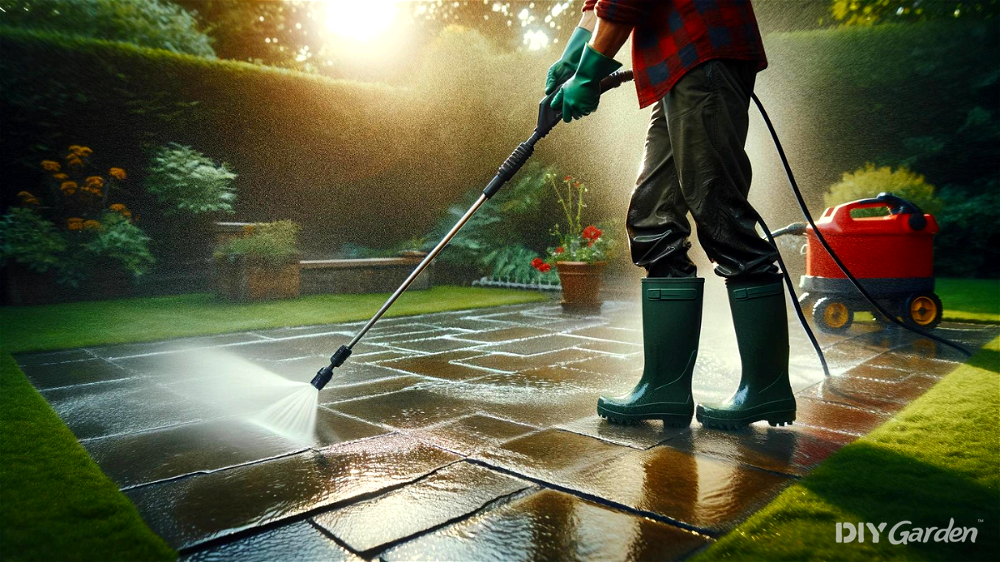
-
Best under £100 - Bosch EasyAquatak 120 High-Pressure Washer
-
Best budget pressure washer - Kärcher K2 Power Control High-Pressure Washer
-
Best portable option - WORX WG620E 18V Cordless Hydroshot Portable Pressure Cleaner
-
Best cheap pressure washer - VYTRONIX PW1500 Electric Pressure Washer
-
Best water pressure - VonHaus 1600W Pressure Washer
-
Best newcomer - Paxcess Electric High Pressure Washer
-
Best long-reach lance - Norse SK25i Portable Pressure Washer
Pressure Washer Under £100 Reviews
1. Bosch EasyAquatak 120 High-Pressure Washer
Best under £100
- Sufficient power for all domestic tasks
- Very compact which makes it easy to store and carry around with you
- Comes with a range of accessories included - a brush, additional nozzle, detergent dispenser bottle and patio cleaner
- Different nozzles are easy to detach and fit
- 5 m power cable and 5 m hose make it possible to clean around car in a driveway
- Whilst a brush is included, the attachment needed to connect hose to brush must be purchased separately
- At under 5 kg, it’s relatively easy to pull/knock over if you’re not careful
- Very loud so could disturb neighbours if used early in the morning
- Water Pressure
- 120 bar
- Flow Rate
- 350 l/h
- Power
- 1500W
- Hose Length
- 5 m
- Weight
- 4.7 kg
- Design
- 5
- Power
- 5
- Ease of Use
- 5
- Versatility
- 5
- Value for Money
- 5
When we tested the Bosch EasyAquatak 120 High-Pressure Washer it scored top marks in all of our testing criteria: ease of assembly, design, performance and value for money. Here at DIY Garden, we believe it’s undoubtedly one of the best pressure washers under £100 on the market today.
When it comes to assembly, this pressure washer is easy to put together in just a few minutes. It’s a compact machine and the hose and lance can be secured tightly against the washer in storage. It comes with a substantial range of accessories, including a high-pressure gun and two additional nozzles, as well as a wash brush attachment, patio-cleaning attachment and detergent dispenser too.
Performance-wise, this pressure washer works very well. It offers 120 bar of water pressure and 1500W of power, which makes it powerful enough for most tasks around the home. It can be used for cleaning cars, patios, bins and garden furniture. When used with the detergent dispenser nozzle, the cleaning solution is applied evenly and consistently.
Overall, this pressure washer is very easy to use thanks to its lightweight and compact design. The 5 m cable and 5 m hose length allow you to work around a car without struggling. It’s also simple to switch between different attachments, and the water pressure can be adjusted quickly by rotating the fan nozzle head.
The only real downside to this pressure washer is that, for some reason, the component required to connect the hose to the brush attachment needs to be purchased separately. So while the brush is included, you’ll need to make an extra purchase in order to use it as intended.
To conclude, I’d say that this pressure washer is a great option for domestic cleaning jobs. In fact, I can’t think of anything that it wouldn’t be able to tackle. Don’t be fooled by the small and compact design; this pressure washer is incredibly efficient and very versatile too.
Did you find this review helpful?
2. Kärcher K2 Power Control High-Pressure Washer[ SAVE 6% ]
Best budget pressure washer
- Assembly is very quick, it only takes about 5 minutes to put together
- 110 bars of pressure is plenty for most domestic cleaning jobs
- It comes with an adjustable nozzle that enables you to use a variety of pressure options
- It's light and easy to move around
- It's relatively quiet, so won't disrupt your neighbours too much!
- You can use water up to 40°C which is useful for cleaning algae or grease
- The cable is 5m, so you're possibly need an extension cable too
- Water Pressure
- 110 bar
- Flow Rate
- 360 l/h
- Power
- 1400W
- Hose Length
- 5 m
- Weight
- 4 kg
- Design
- 5
- Power
- 4.5
- Ease of Use
- 5
- Versatility
- 5
- Value for Money
- 5
The Kärcher K2 Power Control High-Pressure Washer is a model we’re very familiar with having extensively tested it over the past few years. Coming in around £100, it is unquestionably one of the best budget pressure washers on the UK market.
Firstly, there’s no faffing around when it arrives. Assembly takes only 5 minutes, without any tools. All parts connect together very easily and you’re ready to get started.
In terms of design, the iconic Kärcher yellow is modern and reassuring. It’s got robust wheels and an adjustable handle, so whether I’m carting it across the grass or my gravel driveway, it’s easy to move. It’s also got this really neat feature, where a small suction hose at the back can be placed into a bottle of detergent. It sucks it up and mixes it in with the water – cool ay?!
Let’s talk about performance next, because this is really where the K2 beats the competition. What I love most about this model is that you can choose the pressure, from a gentle 20 bar spray (perfect for cleaning my car) to a powerful 110 bar jet which gets my paving looking new again. It’s just so practical and versatile for all my outdoor cleaning requirements, and all at an affordable price point.
Overall, the Kärcher K2 is the perfect domestic pressure washer for those on a budget. I use mine each and every year and always look forward to putting it to work when spring comes around.
Did you find this review helpful?
3. WORX WG620E 18V Cordless Hydroshot Portable Pressure Cleaner[ SAVE 7% ]
Best portable option
- 30 minute battery life is very good for a cordless pressure washer
- It has 5 spraying angles which is really useful for a variety of cleaning tasks
- There's a handy one button switch between low and high pressure
- It's one of the quietest models we've tested
- Charging time of 3+ hours is quite long
- Not practical to use on patios or paving, as the pencil jet (which provides the most power) has quite a thin coverage area
- Water Pressure
- 25 bar
- Flow Rate
- 120 l/h
- Power
- 18V
- Hose Length
- N/A
- Weight
- 3 kg
- Design
- 5
- Power
- 3.5
- Ease of Use
- 4.5
- Versatility
- 5
- Value for Money
- 5
The WORX WG620E 18V Cordless Hydroshot Portable Pressure Cleaner is a really innovative and versatile product. As a family, we love the great outdoors. So being about the chuck the Hydroshot in the boot whenever we go hiking or on camping trips is a god-send!
Of course, being rechargeable, it’s never going to be able to expel the power of the mains operated pressure washer. But with a max pressure of 320 psi (which is about 22 bars) it does a brilliant job of cleaning the car, bikes, wheelie bins, muddy boots etc. Consider this more of a softer cleaner that’s portable.
In terms of assembly, it’s very easy to put together. I didn’t even need to look at the instruction manual, all the parts just fit together quite obviously. And with regard to the design, it’s a really neat looking piece of kit. The trigger feels comfortable to pull and the lance is lightweight and easy to direct.
Let’s talk about performance next. Firstly, the battery life. Charging usually takes me just over 3 hours and I’ll get about 30 minutes of action out of it. This is just about enough for a weekend away, and certainly enough for day trips. Despite how covering in mud the kids get!
With regard to cleaning performance, it’s impressively good for a battery powered model. Of course, it’s never going to make an algae covered patio look brand new again, but that’s not what the Hydroshot is for. It’s a handy, versatile pressure washer for all of those smaller jobs.
Overall, this is the best budget cordless model I’ve tested – and if your family is as active outdoors as mine, you’re going to get great use and value out of it.
Did you find this review helpful?
4. VYTRONIX PW1500 Electric Pressure Washer
Best cheap pressure washer
- Sufficient power for bin cleaning, hosing bikes and washing cars
- Easy to click between spray settings with nozzle
- Assembly is easy and takes around 7 minutes
- Storage hooks and clips can be used to store accessories on the machine
- Thermal sensor turns off the motor if it begins to overheat
- Single plastic filter rather than double which will need regular checking as it’s not easy to see when it gets dirty
- No detergent bottle attachment so any detergent will need to be applied by hand
- Not powerful enough to blast off dried-on dirt
- Water Pressure
- 105 bar
- Flow Rate
- 300 l/h
- Power
- 1400W
- Hose Length
- 5 m
- Weight
- 5.96 kg
- Design
- 4
- Power
- 4
- Ease of Use
- 4.5
- Versatility
- 4.5
- Value for Money
- 4.5
As a good quality, affordable machine the VYTRONIX PW1500 Electric Pressure Washer is the best pressure washer to buy on a budget. Although all of the products featured here are under £100, the VYTRONIX is the cheapest of the lot.
In terms of performance, it offers 105 bar pressure from a 1500 W motor. Overall, it’s best suited to lighter cleaning jobs. It’s still got enough pressure for cleaning out bins, hosing down bikes, and washing the car, but there is a noticeable difference between this washer and more powerful models. Don’t expect it to be removing dried-on dirt, or years of grime off the patio.
It’s also got more going for it than just its price, and it’s a very simple machine to use as well. It can be put together in 7 minutes and is straightforward to operate. It comes with a lance, spray gun and an adjustable nozzle. There are three spray settings to choose from, ranging from jet to fan, and they’re easy to change between with a quick twist. The 5.87 kg weight also means it can be carried around – which is welcome as there are no wheels.
Another nice touch are the storage hooks on the back of the machine. These allow you to keep the accessories somewhere safe when they’re not being used. Also, like most washers that I’ve recommended, the VYTRONIX has a 5 m hose and 5 m cable.
The only real downside with this washer is that there aren’t many accessories included. For example, there’s no detergent bottle attachment, so any detergent will need to be applied by hand.
Also, it has a single filter, made from plastic. Most other pressure washers have a glass filter, so you can at least see when it’s blocked, meaning this one will need to be checked regularly.
As one of the cheapest electric pressure washers on the market, this is a great option for those with a few lighter jobs to tackle – including patio cleaning or garden furniture washing. It’s simple and easy to use but just doesn’t quite have the same ‘blasting’ power as most other models on this page.
Did you find this review helpful?
5. VonHaus 1600W Pressure Washer
Best water pressure
- Very simple to assemble in less than 10 minutes - pieces simply click into place
- Powerful enough for cleaning patios and lifting algae
- Compact machine that’s easy to store
- Double filter helps prevent dirt and debris from getting into the machine
- Weighs just under 6 kg so it’s easy to carry around
- Trigger needs a relatively hard squeeze to work, and needs to be held down constantly
- No extra accessories available such as a brush or additional nozzles
- Water Pressure
- 135 bar
- Flow Rate
- 330 l/h
- Power
- 1600W
- Hose Length
- 5 m
- Weight
- 5.8 kg
- Design
- 4
- Power
- 5
- Ease of Use
- 4.5
- Versatility
- 4
- Value for Money
- 4.5
One of the UK’s best known DIY brands, VonHaus have created this VonHaus 1600W Pressure Washer for tough cleaning jobs. It also has the added benefit of being pretty lightweight.
With a simple design, this pressure washer is one of the easiest to use. It has a 5 m cable and hose and limited attachments: it comes with a spray gun and detergent bottle included. Assembly takes 5-10 minutes, so you can get cleaning straight away.
Out of the pressure washers featured here, it has the highest maximum pressure of 135 bar; however, its standard working pressure is 90 bar. Pressure will vary based on input water pressure and other settings, but this washer is certainly more than powerful enough to clean patios, driveways and garden furniture.
It’s also very easy to use. At just under 6 kg, it’s easy to carry around and the 5 m cable and lance provide enough freedom to move around the drive and patio.
Aside from the spray gun and detergent bottle attachment that come included, there aren’t many additional compatible accessories that can be purchased for this machine. Nevertheless, the adjustable spray nozzle offers a good range of pressures.
This is one of the cheapest machines on this list, so you can understand why there might be a few less features than other washers. It doesn’t have a lockable trigger, which means you do need to tightly squeeze the trigger (it’s a little stiff) whilst you are working.
Nevertheless, it’s a great pressure washer option overall that offers a lot of power considering the price. It will be suitable for the majority of domestic tasks – there just aren’t any accessories to help with cleaning gutters etc. – and delivers the power you would expect from a reputable brand like VonHaus.
Did you find this review helpful?
6. Paxcess Electric High Pressure Washer
Best newcomer
- Can be used with warm water as well as cold - up to 60°C
- Able to draw water from a static water source as well as a hose thanks to the suction function
- Fitted with brass connectors as opposed to plastic
- Hose and cable length are longer than others on the market at 6 m
- 120 bar water pressure is enough for most, if not all, domestic tasks
- Unlike others on this list, a screwdriver is required for assembly to attach the hose hook and handle
- Only fitted with one water filter whilst some other models are fitted with two - more regular maintenance checks requires
- A simple model - not many accessories included, nor additional accessories that can be purchased separately
- Water Pressure
- 120 bar
- Flow Rate
- 450 l/h
- Power
- 1500W
- Hose Length
- 6 m
- Weight
- 7.5 kg
- Design
- 4.5
- Power
- 4.5
- Ease of Use
- 4
- Versatility
- 4
- Value for Money
- 4
The Paxcess Electric High Pressure Washer has been designed to take on just about any cleaning job around the home and garden. It works better than many others on the market due to the fact that it can handle water up to 60°C in temperature. It operates at 120 bar pressure which makes it very versatile.
First, in terms of assembly, this pressure washer does require slightly more effort than some – although nothing major – in that a screwdriver is required. Although a little fiddly, overall it still takes just over 10 minutes to put together.
The build quality is very good; there is a brass connection for the hose instead of plastic, which feels more robust. The hose and cable are 6 m each – offering more reach than even the Bosch EasyAquatak- and gives this good manoeuvrability around obstacles like cars in the driveway.
One of the best things about this 1500 W washer is that it can either receive water via a hose connection or, alternatively, draw water from a bucket instead. This sets it apart from a lot of pressure washers, giving the option to use recycled water from, for example, a water butt, instead of adding to the water bill.
It’s also a very simple machine to use, with limited settings and attachments that don’t overcomplicate the process. There’s one spray gun, with one nozzle, and two pressure settings. Then, there’s one additional setting for when you’re using the detergent bottle attachment.
At 7.36 kg, it’s not the lightest machine on the market. But it’s still relatively easy to handle and slightly less likely to get pulled over than other machines.
Any downsides? Well, unlike the Bosch EasuAquatak, the Paxcess only has one filter instead of two. This means you’ll need to check the machine more regularly, to avoid any build ups. Also, as mentioned – there aren’t a lot of accessories included, nor generally available. This might be a positive for some people, and a drawback for others. If you’re after a simple but effective machine, this is one of the best pressure washers under £100. Just don’t expect to be able to buy compatible accessories separately later down the road either.
Overall, what this pressure washers lacks by way of accessories it makes up for in other ways. Its long power cable and nozzle make it easy to use, and it’s also worth considering for the versatility of being able to draw water from a static water source. Plus, there’s the additional benefit that it can be used with warm water up to 60°C.
Did you find this review helpful?
7. Norse SK25i Portable Pressure Washer
Best long-reach lance
- Powerful enough to remove dried-on mug as well as fresh mud
- Entire unit weighs just 1.5 kg so it’s very easy to handle
- Water comes out almost instantly thanks to the self-priming feature
- ‘Turbo’ setting can remove algae from patios
- Versatile and suitable for a range of tasks including window, patio and car cleaning
- Battery life is short at only 10 minutes
- Relatively noisy given the small size
- There is no clip to prevent the hose from leaving the bucket
- Water Pressure
- 25 bar
- Flow Rate
- 180 l/h
- Power
- 20V
- Hose Length
- N/A
- Weight
- 3.7 kg
- Design
- 4
- Power
- 3.5
- Ease of Use
- 4
- Versatility
- 5
- Value for Money
- 4
Portable pressure washers are loved for their convenience, and if you’re after a convenient, lightweight, cordless option, the Norse SK25i Portable Pressure Washer is worth considering.
This battery powered pressure washer weighs just 1.5 kg and has a 4 m hose. Although it has a reasonably modest pressure of 25 bar, it’s still suitable for cleaning bikes, muddy boots, garden tools and cars. It can remove caked on dirt, as well as fresh mud.
In fact, if you were looking for a portable washer that could be used to rinse pets after a muddy walk, this option is actually too powerful.
It also comes with a range of components included; a battery, charger, multi-jet nozzle and detergent bottle. The 4-in-1 nozzle has three angled spray settings to choose from, a narrow 0° jet, a medium 20° fan and a wide 60° spray. Plus, there is an additional ‘turbo’ setting. The turbo is strong enough to remove algae from patios.
Also, as you would expect from a portable washer, it can draw water from any source – whether that’s a bucket, barrel or hose.
So, whilst this isn’t the most powerful on the market, it’s arguably the best pressure washer under £100 in terms of convenience. It can be put together in a couple of minutes, and the water comes out almost instantly. The battery charges in an hour and the battery life is approximately 10 minutes.
If you’re after a good quality portable pressure washer that can be used anywhere this Norse model is a great option to consider.
Did you find this review helpful?
Product Testers
Compare Product Features
Use the dropdown to sort the table by the feature you want to see.
Bosch EasyAquatak 120 High-Pressure Washer
- 5
- 120 bar
- 350 l/h
- 1500W
- 5 m
- 4.7 kg
Kärcher K2 Power Control High-Pressure Washer
- 4.9
- 110 bar
- 360 l/h
- 1400W
- 5 m
- 4 kg
WORX WG620E 18V Cordless Hydroshot Portable Pressure Cleaner
- 4.6
- 25 bar
- 120 l/h
- 18V
- N/A
- 3 kg
VYTRONIX PW1500 Electric Pressure Washer
- 4.3
- 105 bar
- 300 l/h
- 1400W
- 5 m
- 5.96 kg
VonHaus 1600W Pressure Washer
- 4.4
- 135 bar
- 330 l/h
- 1600W
- 5 m
- 5.8 kg
Paxcess Electric High Pressure Washer
- 4.2
- 120 bar
- 450 l/h
- 1500W
- 6 m
- 7.5 kg
Norse SK25i Portable Pressure Washer
- 4.1
- 25 bar
- 180 l/h
- 20V
- N/A
- 3.7 kg
How to Choose The Best Pressure Washer Under £100
Pressure washers are very versatile and can be used to tackle a range of cleaning jobs around your property. Whether you’re cleaning your car, blasting muddy boots or washing down bikes after a muddy ride, a pressure washer can make a lot of jobs easier.
Pressure washers are available to suit a range of budgets, and I’ve tried and tested a range of pressure washers that are under £100, so even those with a tighter budget can enjoy the benefits of a pressure washer.
One of the main differences when it comes to budget pressure washers is they may not have the same number of accessories (either included, or generally available) as more expensive models.
Take a look at the information and advice below to discover how to find the best pressure washer under £100.
READ NEXT: The UK’s Best Pressure Washers Overall
Budget Doesn’t Mean Bad!
First off, it’s important to make clear that just because a pressure washer costs less than £100, by no means is it a second-rate purchase!
Many pressure washers under £100 still have plenty of power. In fact, many of them will have sufficient power to blast patios clean (which is always a good way to gauge a pressure washer’s power, is it not?).
130-bar pressure washers will be able to do all of the jobs you want done around the house – including brightening up paving. 100-bar pressure washers may not be able to blast away years worth of grime, but they’ll still clean the car and any fresh dirt.
One of the main things that sets pressure washers under £100 apart from pressure washers over £100 is the number of included accessories. With budget pressure washers, you generally don’t get more than a couple of extra nozzles, if that. More expensive machines may come with angled lances, and a larger variety of accessories, to facilitate jobs like cleaning gutters and under car arches.
A Pressure Washer’s Many Uses
If you’re wondering whether a pressure washer is really worth getting, it may interest you to know about all of the versatile ways they can be used.
Of course, traditional uses for a pressure washer include cleaning bikes, lawnmowers, tools, caravans and cars.
However, they can be used in many more ways. More unusual uses of a pressure washer include:
- Cleaning outside surfaces ready for painting
- Cleaning children’s play equipment
- Cleaning outdoor furniture
- Washing floors
- Cleaning fencing
- Collecting leaf fall
- Spot-cleaning mouldy areas
- Cleaning out wheelie bins
- Washing encrusted garden tools
- Clearing guttering
- BBQ cleaning
For some of these tasks, such as clearing guttering, it can help to have a specific angled lance fitted to your pressure washer; however, for the most part, any regular pressure washer can be used for the above jobs!
Choosing the Correct Power
Pressure washers are available to suit a range of tasks, and it’s the power that can make all the difference when it comes to difficult cleaning jobs.
Budget pressure washers under £100 can still be exceptionally powerful, with the most powerful budget pressure washers still boasting over 130 bar pressure.
Decide what you’re going to be using your pressure washer for before choosing the power, because a cheaper, less powerful model may be all you need.
When it comes to pressure cleaning cars, avoid using too much power. Sometimes it’s better to choose a less powerful washer, around 80 – 100 bar, and put in a bit more elbow grease, rather than risk damaging the paintwork.
100 bars and below
- Wheelie bins
- Tools
- Bikes
- Garden furniture
- Car cleaning/caravans
100-130 bars
- Guttering
- Fences
130 bars+
- Decking
- Patios
- Concrete
- Brickwork
Be extra careful when using a pressure washer on brickwork or patios, or anything where grouting is involved. You should only use a pressure washer on these surfaces once or twice a year, max. The strong power of the pressure washer can risk dislodging and damaging grouting.
Using Detergent with a Pressure Washer
Even some budget pressure washers come with a removable detergent attachment. These can be particularly useful when car cleaning, to get an additional sheen.
Alternatively, if you’ve got a lot of mould on your patio, it’s best to use detergent as plain water can spread the spores.
If this sounds appealing, know that it’s still possible to find a budget machine with one of these attachments. Having a detergent bottle attachment often helps the detergent to be applied evenly.
Another option is to simply use a spray bottle to apply detergent to the surface before pressure washing it clean.
Useful Accessories for Specific Jobs
Some budget pressure washers come with a few accessories to help you tackle specific jobs. However, it’s less common for budget machines to come with a large range of additional components.
The following accessories can be useful for completing specific jobs. If you think they might come in handy down the line, try to ensure that the budget machine you’re buying has compatible accessories that can be bought separately.
- Drain and gutter cleaning kits.
- Patio cleaners.
- Telescopic lances (allowing you to reach high areas such as shutters and eaves).
- Extension hoses (giving increased range – a good option if the mains cable isn’t particularly long).
- Under chassis nozzles (allowing you to clean the wheel arches beneath your car).
- Soft pressure washer brush (preventing scratches on glass or caravans).
- One way lances (used to high-pressure spot-clean certain areas).
Electric vs Petrol Pressure Washers
Pressure washers are either electric or petrol powered.
All the budget pressure washers I’ve recommended are powered by electricity. These are best for most domestic tasks, as they are quiet and better for the environment than petrol powered pressure washers.
Electric pressure washers have all the necessary power required for domestic tasks. They also have the added benefit of being very manageable because they tend to weigh around 5 kg.
What about a Battery-Powered Pressure Washer?
Battery-powered pressure washers are another good option, and these are normally cheaper than petrol or mains-powered pressure washers.
The benefit of battery powered pressure washers is that they can be used anywhere. You don’t need a power source nearby, nor an extension cable. They are usually very lightweight and easy to manage.
The downside to battery powered pressure washers is that the battery life is often poor. Most have a battery life of under 15 minutes. However, if you’ve got a couple of shorter, lighter jobs to tackle, a battery powered pressure washer may be the best option.
READ NEXT: The UK’s Best Portable Pressure Washers
Pressure Washer Safety Considerations
Here are some of the risks involved with using a pressure washer and how to avoid these problems:
- Poorly maintained cables. Lots of budget pressure washers are powered using a mains cable. You should ensure the cable is in good condition, as any damage could lead to an electric shock.
- Tripping over. Tripping over your cable is another real risk. Watch where you are stepping and keep pets and children well away.
- Slipping over. To avoid surfaces being more slippery than necessary, don’t use more detergent than you need. Also, wear sturdy shoes. Eye protection will protect you from any water or filth that splashes back.
- Hurting someone. Pressure washers can cause serious harm if aimed at humans or pets. Keep the lance pointing downwards and make sure children stay away from the machine.
Pressure Washing FAQs
It’s important that you read the instructions that come with the pressure washer you purchase. However, most pressure washers work in a similar way.
- Attach the high pressure hose to the lance. Allow your garden hose to run for a few seconds to get rid of any debris inside it.
- Connect the garden hose to your garden tap. Alternatively, place the pressure washer’s suction hose into a bucket or water butt if it is able to draw water from a static source. Check all fittings are tight.
- Plug your pressure washer into the power source (assuming it’s electric) then turn the pressure to the lowest setting.
- Turn the pressure washer on and aim the lance at the floor. Gently squeeze the trigger until water sprays out.
- Work at 45° to the surface that you’re trying to clean. Work from top to bottom.
- Add detergent if needed.
- Rinse the detergent off with water and spray at the widest setting for a final rinse.
Yes, pressure washers are very effective even without detergent. Whilst detergent can help kill germs and bacteria, as well as creating more of a shine, it’s not necessary for all jobs. However, if you’re cleaning mouldy areas, using detergent will help to kill the mould spores and stop them spreading.
Use a spray that is as low pressure as possible for the job. For cleaning the car, consider using a pressure washer between 80 – 100 bar. Using 130 bar will better blast away dirt, but there is a real risk of stripping the paint. Don’t use a 0° jet spray on your car. The narrowest spray you should consider using is 20°. Always test the spray on the ground first, and then on a small, concealed section of the car. Use a very gentle spray for cleaning any glass windows.
Start typing and press enter to search

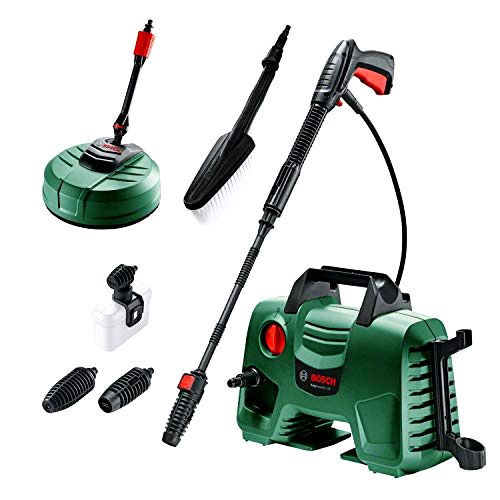
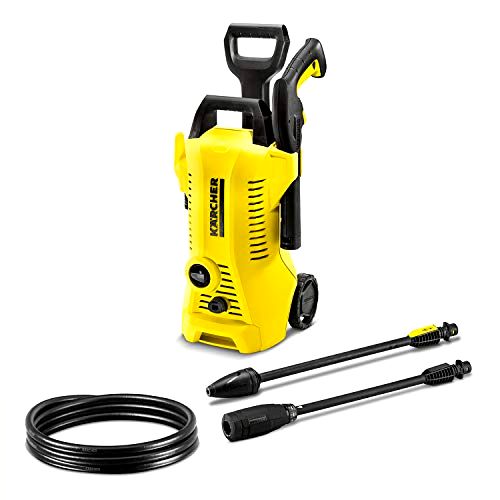
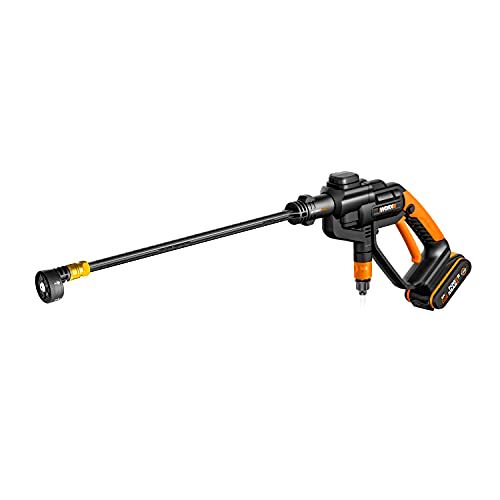
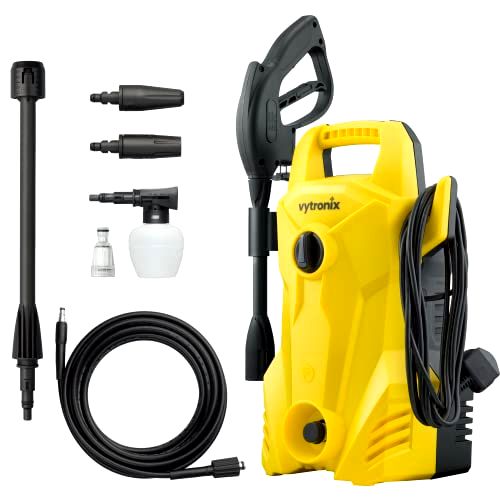
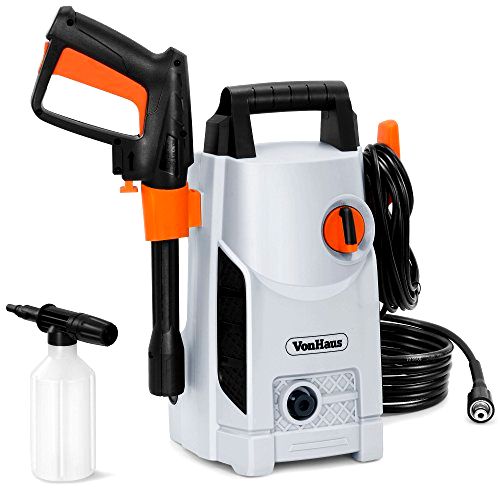
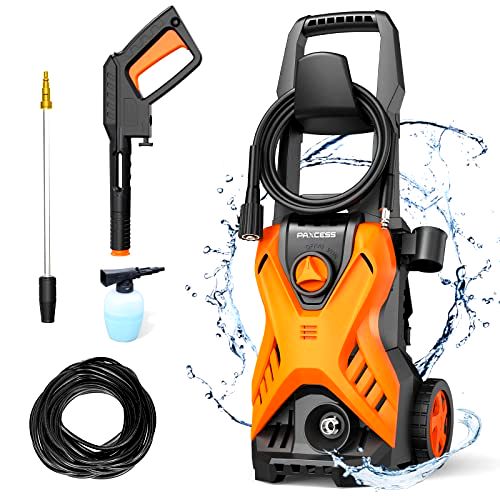
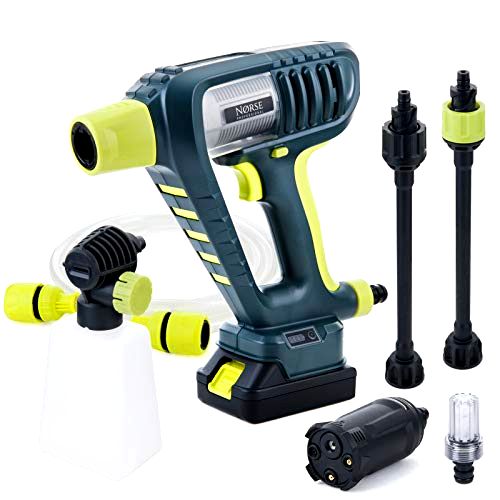
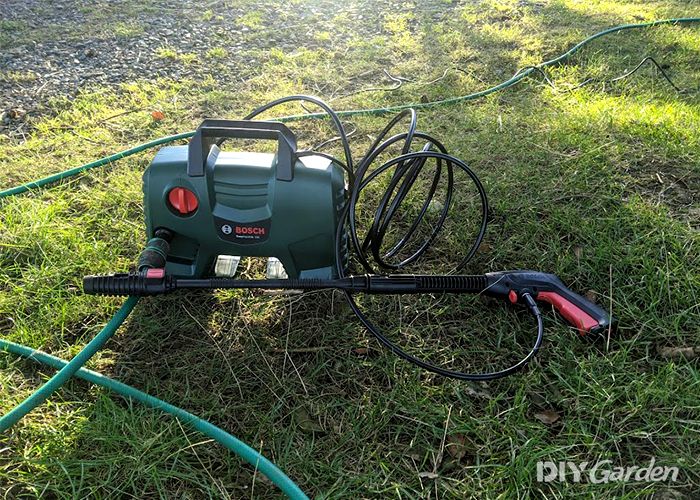
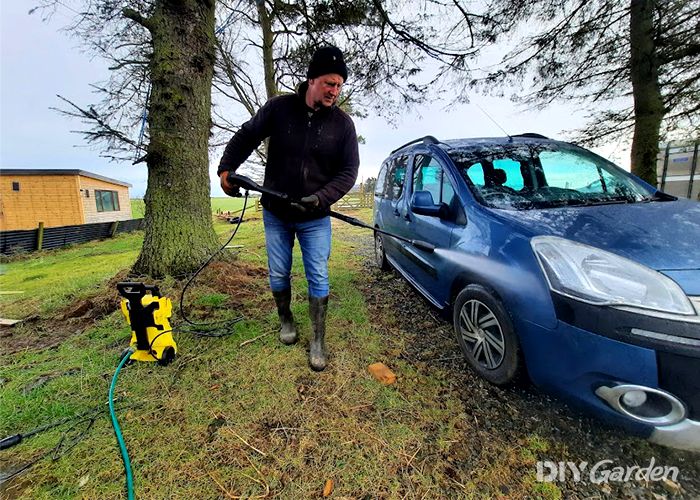
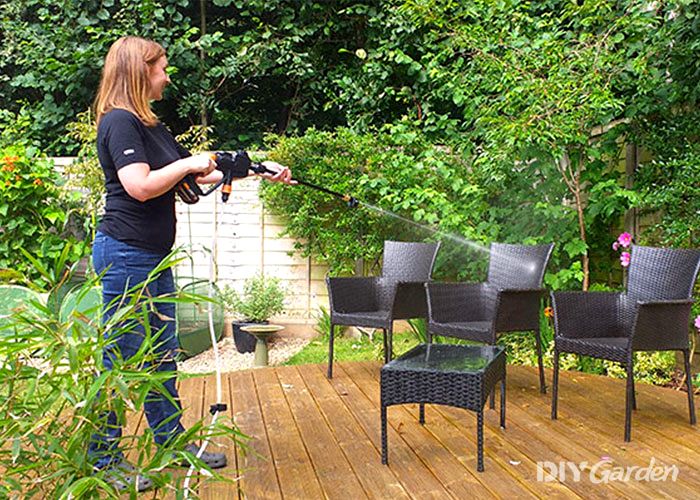
Share